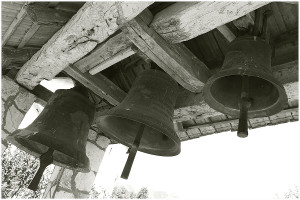 It is not uncommon for me to wake in the morning (or in the middle of the night) with a song in my spirit, and recently it has been Christmas songs that have been rolling around inside me as I stumble from slumber to the world of wakefulness. One tune in particular that has recurrently been on my lips in my waking moments for the past couple of weeks is I Heard the Bells on Christmas Day.
It is not uncommon for me to wake in the morning (or in the middle of the night) with a song in my spirit, and recently it has been Christmas songs that have been rolling around inside me as I stumble from slumber to the world of wakefulness. One tune in particular that has recurrently been on my lips in my waking moments for the past couple of weeks is I Heard the Bells on Christmas Day.That’s not true. It has been not the tune to this familiar song that will not let me be, but the lyrics – more specifically those words relating to peace on earth. The story begins here:
For unto us a Child is born, unto us a Son is given;
And the government will be upon His shoulder.
And His name will be called Wonderful, Counselor, Mighty God,
Everlasting Father, Prince of Peace.
Of the increase of His government and peace there will be no end,
Upon the throne of David and over His kingdom, to order it and establish it with judgment and justice
From that time forward, even forever. The zeal of the Lord of hosts will perform this.
Isaiah 9:6-7
It continues with the writing of I Heard The Bells On Christmas Day, an offering by American poet Henry Wadsworth Longfellow originally titled Christmas Bells. It was written on Christmas Day in 1864. America was in the throes of the Civil War and was still four months away from Lee’s surrender to Grant (April 9, 1865). Longfellow’s wife had been killed in a tragic accident in 1861, and his son seriously wounded in battle in 1863.
And in despair, I bowed my head: “There is no peace on earth,” I said,
“For hate is strong and mocks the song of peace on earth, good will to men.”
As I hear these words rumbling around in me as I come awake, my heart is quickened. I cannot help but hear them in the context of the division and unrest in our nation and around the world today. Not wanting to linger here, I quickly move on to the next verse. Somehow, in the midst of gripping personal loss and a war-weary nation, Longfellow found comfort in the pealing of bells on Christmas day, likely from a nearby church – bells that wordlessly proclaimed a message of hope and restoration that we desperately need to hear even now:
Then pealed the bells more loud and deep: “God is not dead, nor doth he sleep;
The wrong shall fail, the right prevail, with peace on earth, good will to men.”
It is very easy to get discouraged and even feel hopeless when we take in all the lawlessness that is rampant in our nation and the world. Every day seems to bring with it a deeper level of insanity in a world that appears to have gone mad. But regardless of what we see and hear all around us, our God is still the same God of whom we can say, ‘The Lord lives,’ in truth, in judgment, and in righteousness; the nations shall bless themselves in Him, and in Him they shall glory.” (Jeremiah 4:2) Our hope, individually and as a nation, rests securely in the fulfilled promise and person of Jesus Christ. And peace is promised.
Peace on earth is not just a sweet ideal, something we mindlessly sing about in a Christmas carol. It is the mission of the Prince of Peace, the message of Heaven itself to a humanity that even now is writhing in the pain and agony that comes from our having sought our own misguided way in our own faulty wisdom. It is the anthem of hope that rings through the night now just as it did so long ago on a hillside on the other side of the world when a band of shepherds were entrusted with the most glorious news ever proclaimed. They ran to see for themselves that what they had been told was true. And having had their own face-to-face encounter with Jesus, they told everyone what they had seen and been told. May we do the same.
And suddenly there was with the angel a multitude of the heavenly host praising God and saying:
“Glory to God in the highest, and on earth peace, goodwill toward men!”
Luke 2:13-14
***
Footnote: The poem “Christmas Bells” originally had seven stanzas, two of which contained references to the American Civil War and were eventually removed. The remaining five stanzas were slightly rearranged and set to music by John Baptiste Calkin in 1872.


